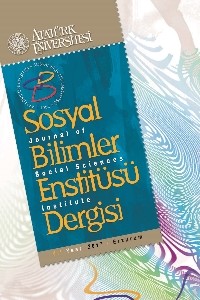Bilgi ve İletişim Teknolojilerinin İstihdam Üzerine Etkisi: Seçili Ülkeler Üzerine Bir Uygulama / The Effect of Information and Communication Technologies on Employment: An Empirical Study upon Selected Countries
Abstract
Öz: Bu çalışmanın amacı, bilgi ve iletişim teknolojilerinin istihdam düzeyi üzerindeki
etkisini incelemektir. Mevcut çalışmada Türkiye’nin de içinde yer aldığı G-20 ülke grubu
için panel veri analizi yapılmıştır. Bu ülke grubunun ekonomik yapıları arasında büyük
farklılıkların olması ve bu durumun ekonometrik olarak sonuçlarda karışıklığa neden
olmaması için, söz konusu ülkeler gelişmiş ülke (GÜ-7) ve gelişmekte olan ülke (GOÜ-
13) şeklinde iki gruba ayrılarak analizler gerçekleştirilmiştir. Bununla birlikte, bilgi ve
iletişim teknolojilerinin istihdam üzerindeki etkisi, 1991-1999 ve 2000-2012 gibi iki ayrı
dönem aralığında test edilmiştir. Bir kısıt olarak G-20 içerisinde yer alan Çin, Güney
Afrika ve Suudi Arabistan yetersiz veriye sahip olması nedeniyle, Avrupa Birliği’nin ise
kendi başına bir veriye sahip olmaması nedeniyle uygulamanın kapsamı dışında tutulmuştur.
Çalışmanın sonucunda, bilgi ve iletişim teknolojilerinin 1991-1999 döneminde
gelişmiş ülkelerde pozitif ve anlamlı bir değere sahipken, gelişmekte olan ülkelerde pozitif
ve anlamsız; 2000-2012 döneminde ise gelişmiş ülkelerde negatif ve anlamlı bir değere
sahipken, gelişmekte olan ülkelerde pozitif ve anlamlı olduğu bulguları elde edilmiştir.
Anahtar Kelimeler: Bilgi ve İletişim Teknolojileri, İstihdam, Ücret, Gayri Safi Yurtiçi
Hasıla, G-20
The Effect of Information and Communication Technologies on
Employment: An Empirical Study upon Selected Countries
Abstract: The aim of the present study is to analyze the impact on employment levels
of information and communication Technologies. Thus, in this study panel data analysis
is performed for developed twenty countries (G-20) including Turkey. Since there
are many differences in the economic structures of this group of countries, this might
cause confusions in econometric results. In order to avoid confusion, these countries
are analyzed by dividing into two groups as developed (G-7) and developing countries
(GOU-13). However, the impacts on employment of information and communication
technologies two separate periods are tested in a range as, 1991-1999 and 2000-2012
As a constraint, China, South Africa, Saudi Arabia were excluded for nonsufficient data
while the European Union was excluded for not having data for itself. This study concludes
that information and communication technologies had a positive and meaningful value
in the developed countries during the period from 1991 to 1999 while it is positive but
meaningless in the developing countries; during the period 2000-2012, however, it is
negative and meaningful in the developed countries while it is positive and meaningful in
the developing countries.
Keywords: Information and Communication Technologies, Employment, Wage, GDP,
G-20
Details
| Journal Section | Makaleler |
|---|---|
| Authors | |
| Publication Date | October 11, 2016 |
| Published in Issue | Year 2016 Volume: 20 Issue: 2 |



